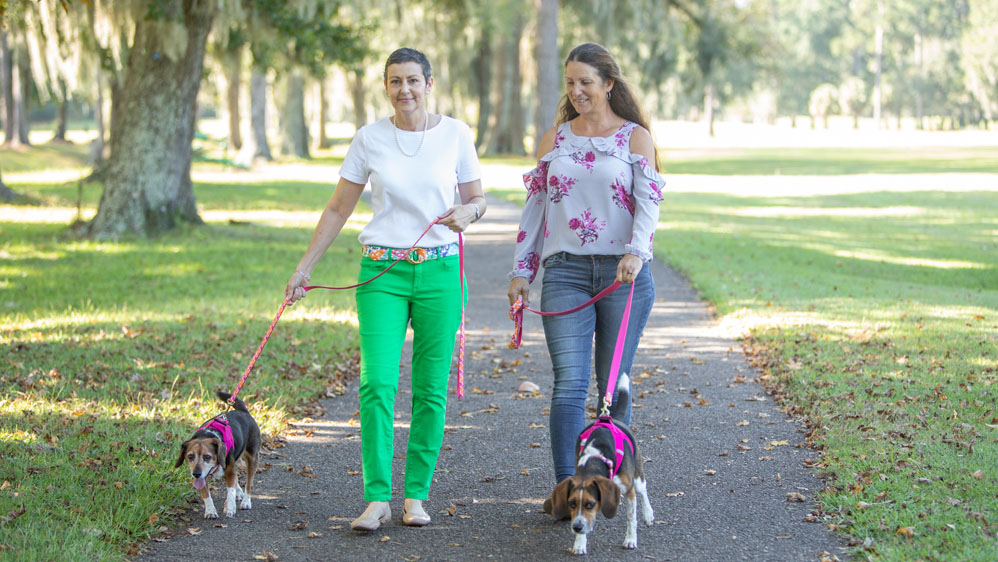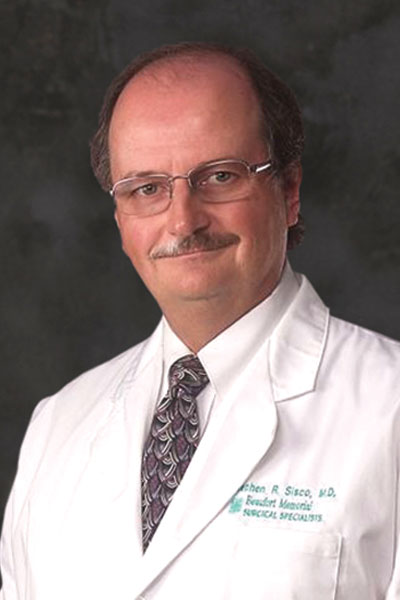'Picture of Health' Woman Faces Breast Cancer and Wins
October 1, 2018
"Everybody has been so great through the entire process. I got a good prognosis and am now ready to get back to my life."

Waking up at 4:30 a.m. to work out at the gym never bothered 49-year-old Rose Hill resident Paula Davis. The five-day-a-week morning routine kept her fit and feeling strong.
So, when she felt a lump in her left breast last fall, she was sure it was nothing more than a benign cyst. She had no family history of breast cancer and the annual mammogram she had in February showed everything was normal.
"I thought, I'm healthy," Davis recalled. "I'm OK."
But just to be sure, she made an appointment at Beaufort Memorial Obstetrics and Gynecology Specialists. After a clinical breast exam, she was sent over for a diagnostic mammogram and ultrasound at the hospital's Breast Health Center.
A few days later, Davis met with Beaufort Memorial general surgeon Dr. Stephen Sisco to discuss the results of the imaging tests. Unable to determine with certainty that the lesion in her breast was just a cyst, he recommended a needle biopsy. The day after the procedure, he called to give her the bad news - the tumor was malignant.

Davis couldn't believe what she was hearing. "I was stunned," she said. "It didn't make sense. I was the picture of health."
Two days later, she met with Beaufort Memorial's certified breast care navigator Dana Wilson, RN, who went to work helping her schedule additional testing and appointments with the three specialists who would be treating her cancer.
"A diagnosis of breast cancer can be overwhelming to patients," Wilson said. "They get so much information, they can't process it all. I'm there to answer questions and help guide them through the months of treatment that lie ahead."
Tests revealed Davis had a stage 2 triple-negative tumor, an aggressive type of cancer that does not respond to hormone therapy. After evaluating her case, her cancer team developed an evidence-based treatment plan that would include a lumpectomy, chemotherapy and radiation.
Because her cancer was triple negative, her medical oncologist, Dr. Marcus Newberry, recommended that she receive chemotherapy prior to her surgery.
"By giving her chemotherapy prior to surgery, we are able to assess how effective the treatment is and also make the surgery easier," Newberry said. "If there is not any residual cancer at the time of surgery, also known as a pathologic complete response, then we are very encouraged that the treatment was successful and she is cured. If there is residual tumor, we are able to recommend more therapy and increase the chance of cure."
Davis had her first treatment in January in the hospital's chemotherapy and infusion center. She continued to receive the treatments once a week for the next 15 weeks, followed by four more biweekly infusions of a powerful, cancer-fighting drug.
"My sister-in-law, Amy Parent, went with me to every chemo treatment and doctor's appointment," Davis said. "She was my rock, my angel. I couldn't have gotten through it without her."
When Davis's hair started to fall out in the first few weeks of chemo, Amy shaved her head.
"I would come in to the infusion center to check on Paula and I would find the two of them laughing and having a ball," Wilson said. "Amy really kept Paula's spirits up."
At the time her surgery was scheduled in late June, Beaufort Memorial had just invested in Savi SCOUT, an advanced breast lesion localization and surgical guidance system shown to improve patient care. The FDA-cleared tool uses radar to detect a reflector that is placed at the tumor site. A micro-impulse signal assists the surgeon in accurately locating the reflector, along with the target tissue.
"It's a great technological advancement in breast cancer surgery," Sisco said. "It allows us to have better control of where we make the surgical incision for the best cosmetic outcome."
In addition to the tumor tissue, Sisco removed three lymph nodes to be sure the cancer had not spread. A biopsy of the tissue revealed a pathologic complete response to the chemotherapy, indicating there was no sign of cancer in the tissue sample.
"She had the best result we could hope for," Newberry said. "She can feel comfortable that she is cancer free."
With the surgery behind her, Davis began the prescribed six weeks of daily radiation therapy in late August. Weeks into the treatment, she feels strong enough to walk her two beagles and is looking forward to going off-roading with her husband when she completes her radiation therapy this month.
"Everybody has been so great through the entire process," Davis said. "I got a good prognosis and am now ready to get back to my life."
This Beaufort Memorial patient story first appeared in the October 8, 2018, issue of The Bluffton Sun.

